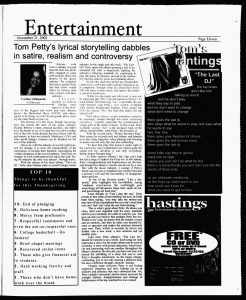Tom Petty's lyrical storytelling dabbles in satire, realism and controversy
By Carlina Villalpando
The Yellow Jacket -- November 21, 2002
Anyone with even a smidge of good musical taste has probably engaged in some conversation about the demise of the music industry. We complain that music quality flails and that artists would rather be famous than truly connect with their audience.
Though, recently, we seem to be finding some reprieve as the notoriety of the biggest and worst pop stars, Britney Spears, the Backstreet Boys, NSYNC and others, appear to be dying, we can't let our guards down, turning the radio back on just yet.
The absence of a few faces, though reassuring, does not restore the state of the music industry. Despite Britney's many praised faculties, she didn't have the brains of savvy to spur her own idol worship, and so the root of the demise has never been with the performers, at least not entirely. Marketers, CEOs, and other profit hungry conmen can be thanked for the ruin of the industry.
However, with the industry in just the right position for change, it is now the responsibility of the entertainers to reclaim their medium. Anticipating the volatile dynamics of the record industry, Tom Petty, no stranger to such confrontation, has taken the lead, facing the industry the only way natural -- through music.
With the release of his latest album, "The Last DJ," Petty takes blatant stabs at a profit hungry music industry. In the single and title track, "The Last DJ," Petty opens the album spinning the tale of an alienated DJ, who is hopelessly fighting the industry's faltering standards by continuing to play the music he chooses, instead of the mediocrity the industry execs keep handing down.
So far, this track has stirred up considerable controversy, with some radio stations refusing to air it completely. Perhaps some are afraid their lowly DJs will come to their senses and oppose the pathetic spiral of mediocrity.
While it is the single and title track, it may not be surprising that "DJ" is not the harshest of Petty's 12 track album. The third song "Joe" is probably the outright meanest song Petty's ever written. Complete with sinister background laughter, Petty names the CEO Joe saying, "He's the man that makes the big wheels roll."
Petty takes a heavy, nearly monstrous sound as he seemingly stomps through this track, criticizing executives' exploits, especially the sexualization of young girls in the name of music. In this track, Petty is plainly vicious. "Joe" is the strongest track of the album, and probably, what Petty's the proudest of.
With his second track, "Money Becomes King," Petty names his wearied rock star Johnny, and laments over days long forgotten, when playing and listening to music was not only fun, but also redeeming.
"To hear him play that music/it spoke right to my soul/every verse a diamond/every chorus gold/the sound was my salvation/it was only everything/before money became king."
As Petty exposes Johnny's life, fans can't help but feel a tinge of sadness for Petty too. In this album, Petty's disappointment and hopelessness are obvious, and though this album is clearly one driven by a conflict with the music industry, I wonder if Petty's intent was not also to emphasis the conflict between a person's will and the inevitability of disappointment and loss.
In one of my favorite tracks, "Like a Diamond," Petty highlights this inevitability, saying "madmen crawl/across the wall/knight gets away/kings all fall/queens chase men/saints all sin/and good things all must end."
Later though, in "Can't Stop the Sun," Petty returns to this sense of inevitability, but now, he finds hope there saying, "you may take my money/you may turn off my microphone/but you can't steal what you can't feel/can't stop the sun from shining."
This is what's great about Petty. He draws you close, until you're engulfed with his story, attached, and for a moment, he's able to convince you. You give up and you believe that perhaps Petty has too. Within every song, he shares with his listener a story and an emotion, and then he takes you beyond listener and spectator and makes the emotion intensely your own. Then, within seconds, he drives you further, into a new track, a new emotion and yet another story.
Like most Petty albums, "The Last DJ" should be listened to as a whole. Each song not only represents a story, but the entire album can be seen as a journey -- a story with actual characters, which reoccur and interacting with one another throughout the album's duration. By the end, you have not only witnessed the unfolding of a story, but you've seen Petty's thoughts manifested. As the tracks change, contrasting, you're not only hearing a different beat, but also a different thought, emotion -- feeling.
Despite some criticism, Petty is not feeling neglected, forgotten, and now lashing out at an industry and audience that once embraced him. Yet, Petty's plight is personal, and his music uncovers his outright sadness, disappointment and feelings of helplessness at having watched his love ruined.

